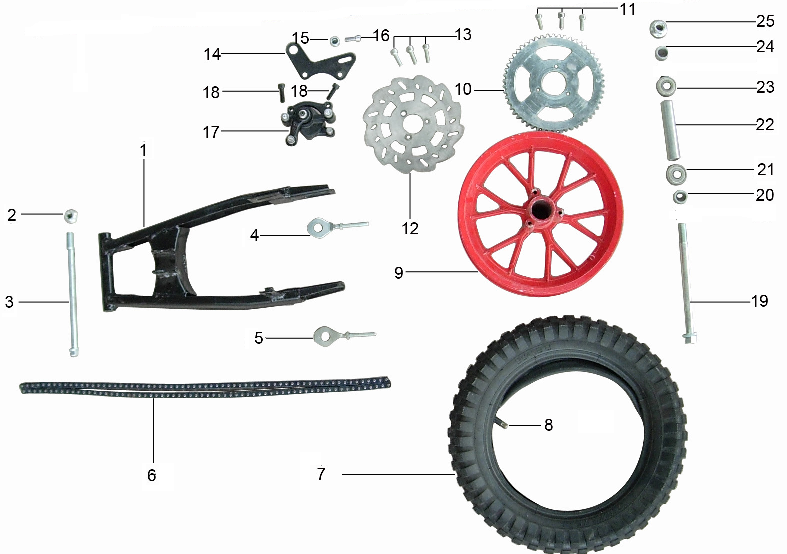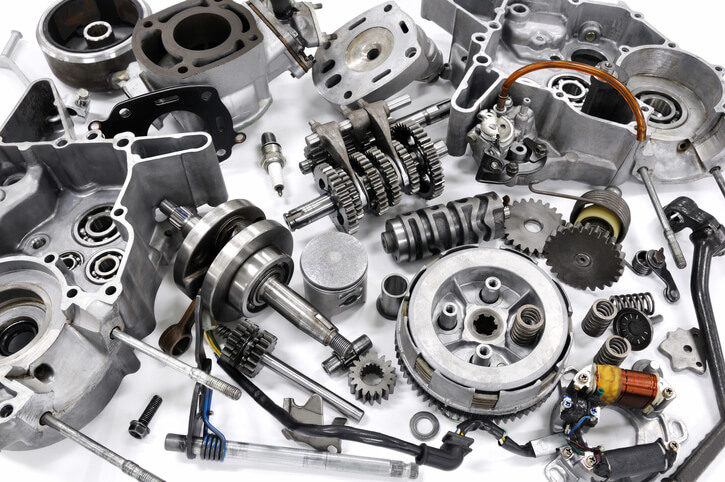Mechanic Advice on Maintaining Durable Bike Parts Wellington
Mechanic Advice on Maintaining Durable Bike Parts Wellington
Blog Article
Discover the Important Motorcycle Parts You Required for Ideal Efficiency
Recognizing the important parts of a motorbike is essential for achieving peak performance. Each element, from the engine to the braking system, plays an essential function in total capability and security. Normal maintenance can avoid unforeseen failings and boost the riding experience. Numerous riders ignore the details of these systems. Discovering just how they interact can result in an extra reliable adventure. What crucial parts should every motorcyclist prioritize?
The Engine: The Heart of Your Bike
The engine offers as the core component of a motorcycle, driving its performance and specifying its capacities. It is accountable for transforming gas into mechanical power, which powers the bike forward. Different kinds of engines are utilized, including single-cylinder, V-twin, and inline setups, each offering distinctive characteristics suited for various riding objectives and designs. The engine dimension, usually gauged in cubic centimeters (cc), substantially influences performance, with bigger engines usually providing even more power and torque.Furthermore, the engine's style and innovation, such as gas injection systems or air-cooling versus liquid-cooling, impact effectiveness and dependability. Maintenance is important for peak procedure; elements like normal oil adjustments and monitoring ignition system warranty durability. Riders often think about an engine's responsiveness and level of smoothness, as these characteristics improve the general riding experience. Ultimately, the engine continues to be a critical component that defines not just the motorcycle's performance however also the cyclist's link to the equipment.
The Transmission: Moving Gears Efficiently
The transmission plays an important duty in a motorbike's performance, specifically in the mechanics of equipment moving. Comprehending just how to move equipments smoothly can boost the overall riding experience, while routine maintenance assurances peak functionality. Correct attention to these aspects can greatly influence the longevity and performance of the motorcycle.

Gear Shifting Mechanics
Smooth equipment shifting is important for excellent motorbike efficiency, significantly influencing both acceleration and control. The technicians of gear changing involve the interaction between the clutch, gear bar, and transmission system. When a rider engages the clutch, it disengages the engine from the transmission, permitting a gear modification without harming the elements. A well-timed launch of the clutch, incorporated with precise motion of the equipment bar, helps with a smooth change between equipments. This procedure guarantees that the engine operates within its finest power band, boosting performance. Motorbike Components NZ. Furthermore, understanding the equipment proportions and their impact on speed and torque can assist cyclists make informed choices throughout changes, eventually adding to an extra delightful and receptive riding experience
Upkeep Tips Importance
Regular maintenance plays a necessary role in ensuring that the transmission system operates effectively, permitting smooth equipment shifts. On a regular basis changing the transmission and examining liquid is essential, as old fluid can bring about enhanced rubbing and wear. Furthermore, checking the clutch for wear assurances peak interaction and disengagement, stopping slippage during gear changes. Lubrication of relocating components is similarly essential to decrease friction and boost efficiency. Motorbike owners should additionally monitor for leakages and unusual sounds, as these can show underlying problems. By adhering to these upkeep ideas, motorcyclists can prolong the lifespan of their transmission system, assuring that gear changes stay seamless and adding to the general performance of their motorcycle.
The Braking System: Ensuring Security on Every Ride
Braking systems are basic elements that straight affect a motorbike's safety and security and performance. They include different parts, consisting of brake pads, rotors, calipers, and hydraulic lines, all functioning together to assure efficient slowdown. The type of braking system-- commonly either disc or drum-- impacts responsiveness and quiting power.Regular maintenance is vital to support peak performance; used brake pads can result in reduced efficiency and increased quiting ranges. Additionally, the top quality of brake fluid need to be kept an eye on, as it can soak up moisture with time, compromising stopping efficiency.Riders need to also think about the relevance of anti-lock braking systems (ABDOMINAL), which protect against wheel lockup during abrupt quits, boosting overall security. Effectively functioning brakes are not nearly quiting; they instill confidence in the motorcyclist, enabling safer navigation with numerous surfaces. Inevitably, a reputable stopping system is crucial for delighting in every experience with assurance.
The Suspension: Enhancing Comfort and Control
A well-functioning suspension system considerably contributes to a motorbike's overall performance, enhancing the performance of the stopping system. The suspension plays a considerable function in absorbing shocks from uneven surface areas, assuring a smoother ride while keeping tire call with the road. This contact is essential for both security and control, permitting motorcyclists to navigate corners with self-confidence and precision.Different sorts of suspension systems, such as telescopic forks or mono-shocks, offer differing degrees of comfort and handling. Effectively tuned suspension boosts responsiveness, supplying the biker with a more linked feeling to the motorbike. Normal maintenance checks are very important to ascertain the suspension parts, including springtimes and dampers, are functioning at their ideal. An efficient suspension system not just raises the riding experience but likewise adds to the long life of other motorcycle parts by decreasing deterioration. Because of this, spending in quality suspension is essential for any type of significant motorbike fanatic.
The Tires: Linking You to the Roadway
Tires play a necessary role in a motorcycle's performance, functioning as the primary web link in between the road and the motorcyclist. Understanding the various kinds of tires offered can greatly affect handling and security. In addition, regular maintenance is crucial to assure peak tire performance and durability.
Tire Keys In Explained
How do different tire types affect a motorcycle's performance? Tire types play a crucial duty in identifying a motorcycle's hold, handling, and security. Sport tires, created for high efficiency, deal enhanced traction and responsiveness on paved roads, making them suitable for competing and hostile riding. Alternatively, touring tires prioritize longevity and comfort, offering a smoother experience for long-distance traveling. Off-road tires, identified by their sturdy tread patterns, excel in traction on unpaved surfaces, ideal for journey enthusiasts. In addition, dual-sport tires blend qualities from both off-road and on-road groups, satisfying versatile riding needs. Ultimately, selecting the right tire type is important for enhancing performance, guaranteeing security, and enhancing the total riding experience.
Maintenance Tips Offered
While riding when driving, preserving optimal tire condition is vital for safety and efficiency. Consistently inspecting pop over to this web-site tire pressure is necessary, as under-inflated tires can lead to inadequate handling and boosted wear. It is a good idea to check tread deepness often; worn tires concession hold and stability. Furthermore, motorcyclists ought to look for indicators of damage, such as bulges or splits, which can suggest the need for substitute. Rotating tires occasionally ensures even put on, improving long life. Maintaining tires clean from particles and preventing too much visuals can lengthen their life expectancy. Preserving correct positioning and equilibrium contributes to peak efficiency, minimizing anxiety on various other bike components. Abiding by these upkeep suggestions will substantially enhance the general riding experience.
The Gas System: Fueling Efficiency and Performance
The fuel system plays a crucial duty in optimizing a motorbike's performance and effectiveness, as it assures the optimal shipment of a knockout post gas to the engine. It consists of several vital parts, consisting of the gas tank, fuel pump, fuel filter, and gas injectors or carburetor. Each component has to operate effectively to ensure a smooth and powerful ride.The gas storage tank stores fuel and supplies it to the engine using the gas pump, which generates the required pressure. A gas filter prevents contaminants from going into the engine, while the injectors or carburetor mix fuel with air for combustion.Proper maintenance of the fuel system is vital; a clogged filter or malfunctioning injector can bring about lowered efficiency and enhanced fuel usage. By verifying that the fuel system operates efficiently, bikers can delight in improved throttle response, better gas economy, and overall enhanced riding experience.
The Electric System: Powering Your Adventure
A reliable electric system is vital for the general performance and safety of a motorcycle, as it powers essential parts such as the ignition, lights, and different electronic systems. This system consists of the battery, which shops energy, and the generator, in charge of producing power while the engine runs. The electrical wiring harness connects these parts, making certain trustworthy power distribution.Additionally, merges safeguard the system from overloads, while relays help regulate high-current tools with low-power signals. A well-maintained electric system improves performance by making certain smooth begins and consistent procedure of lights and signals, vital for cyclist exposure and safety.Regular checks of the battery's charge and links are necessary for preventing electric failures. Cyclists must also evaluate circuitry for damage, making sure all components operate ideally. Eventually, a durable electric system adds significantly to the total performance and integrity of the motorbike.
Often Asked Inquiries
Exactly how Often Should I Replace My Bike's Battery?
The frequency of motorbike battery substitute depends on usage and upkeep (Motorcycle Parts Auckland). Normally, batteries need to be replaced every three to 5 years. Normal checks can aid identify when click this a substitute is essential for peak efficiency
What Tools Do I Need for Fundamental Motorbike Upkeep?
For standard motorcycle maintenance, one requires crucial tools such as a socket set, wrenches, screwdrivers, pliers, tire stress gauge, and a torque wrench. These tools facilitate reliable upkeep and assure the motorbike runs effectively and safely.
Exactly How Can I Enhance My Bike's Aerodynamics?
To enhance bike aerodynamics, one need to take into consideration readjusting fairings, using windscreen expansions, maximizing body position, and lowering total weight. These adjustments help minimize drag, enhancing stability and gas efficiency throughout experiences.
What Are the Indications of a Failing Electrical System?
Indicators of a stopping working electrical system include lowering lights, problem beginning, irregular instrument readings, and blown merges. Motorcycle Parts Auckland. Uncommon smells or rust around battery terminals might likewise show underlying concerns needing immediate attention for safety and security and efficiency

Exactly how Do I Select the Right Oil for My Motorbike?
When picking oil for a motorcycle, one need to take into consideration the supplier's specifications, thickness ratings, and the kind of riding. Furthermore, artificial versus standard oil can influence performance and engine defense, affecting the choice substantially. The engine dimension, usually determined in cubic centimeters (cc), considerably influences performance, with larger engines normally offering even more power and torque.Furthermore, the engine's layout and technology, such as fuel injection systems or air-cooling versus liquid-cooling, influence efficiency and integrity. A well-functioning suspension system considerably adds to a motorbike's overall efficiency, enhancing the effectiveness of the stopping system. The gas system plays a vital function in optimizing a motorcycle's efficiency and effectiveness, as it assures the ideal delivery of gas to the engine. A fuel filter stops contaminants from going into the engine, while the injectors or carburetor mix gas with air for combustion.Proper maintenance of the gas system is essential; a clogged up filter or malfunctioning injector can lead to reduced efficiency and increased fuel consumption. A properly maintained electrical system enhances efficiency by ensuring smooth starts and constant procedure of lights and signals, vital for motorcyclist presence and safety.Regular checks of the battery's charge and connections are vital for preventing electrical failings.
Report this page